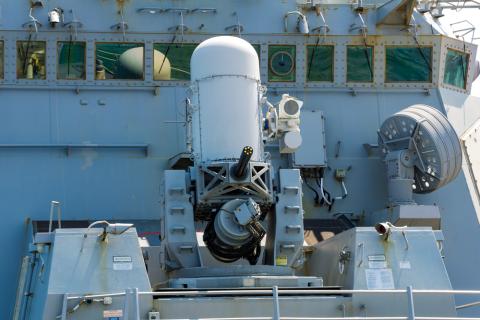
"US warships in the Red Sea, including USS Carney (pictured), have shot down a number of drones and missiles launched from Al-Houthi-controlled territory in recent weeks. Continued failures may result in Al-Houthi rebels using increasingly destructive and indiscriminate methods in their efforts to target perceived Israeli assets."
The ongoing Israel-Hamas war is likely to continue destabilizing maritime security off the Arabian Peninsula over the short-to-medium term. The conflict has resulted in several regional powers and proxies declaring solidarity with Palestinians and a willingness to target Israeli and US assets. These include the Lebanese Hizballah, the Yemeni Al-Houthi rebels, a variety of Iranian-backed militias in Syria and Iraq, as well as Iran itself. Iran and the Al-Houthis have targeted shipping in the waters off the Arabian Peninsula since the beginning of the Israel-Hamas war Oct. 7. Although attacks so far seem to have been limited to US warships and civilian vessels with alleged links to Israel, the threat level for all shipping has increased due to the potential for misidentification, miscalculation, and collateral damage. Initial attacks appeared aimed at causing disruption and as symbolic support for Palestinians, rather than causing significant damage and casualties, though repeated failures have possibly resulted in the employment of more destructive weaponry and methods to achieve the same ends, a trend which may continue over time.
The Red Sea Threat
Since the Oct. 7 Hamas attack on Israel and subsequent Israeli response in Gaza, the Yemeni Al-Houthi rebels have released several statements threatening to strike Israeli territory and shipping in support of Palestinians. Yemen’s location at the southern entrance of the Red Sea, thereby potentially controlling access to the Suez Canal, makes these threats particularly significant. Approximately 12 percent of global trade uses the canal annually, with most of these vessels also transiting the Bab-al-Mandeb Strait between Yemen and Djibouti.
The Al-Houthi rebels have been implicated in several incidents off Yemen since mid-November. These include the hijack of the Galaxy Leader vehicle carrier Nov. 19, owned by a company founded by an Israeli billionaire. The vessel was subsequently sailed to Al-Hudaydah in western Yemen, where it remains. A similar hijack was attempted against the Israeli-owned cargo vessel Central Park Nov. 27; the intervention of US and Japanese forces resulted in the detention of the five perpetrators and release of the ship. US authorities periodically announce the interception of drones over the southern Red Sea, some possibly targeting vessels, and drones and missiles have been launched in the direction of US warships, including immediately following the attempted hijack of Central Park, though none have been successful.
Al-Houthi Capabilities
The Al-Houthis, who are backed and supplied by Iran, possess a powerful arsenal of anti-ship weaponry, including drones, cruise and ballistic missiles, waterborne improvised explosive devices (WBIEDs), and naval mines. Initial attacks on civilian vessels appear to have been aimed at disrupting shipping through attempted hijackings and drone attacks rather than causing significant damage and casualties. This mirrors the style of attack employed by Iran against shipping in the Arabian Sea and Gulf of Oman in recent years. However, a series of attacks on three vessels Dec. 3 may indicate a shift in direction for the group. Reports indicate that a number of anti-ship missiles were used, with US Central Command (CENTCOM) stating that at least one anti-ship ballistic missile (ASBM) was employed. This is the first confirmed use of this type of weapon globally, though ASBMs were also likely used following the Central Park incident. It is possible that the group has chosen to escalate following a series of setbacks brought about by a significant US and US-aligned naval presence in the southern Red Sea and Gulf of Aden, and the coming weeks may see a more destructive and indiscriminate approach emerging. Though unlikely at present, this may include the use of naval mines in key areas, increasing the likelihood of collateral damage and the possibility of a threat lingering even after the end of Israeli operations in Gaza, especially if mines break away or if newly placed minefields are not accurately mapped. The scale of any future escalation is also likely to depend on how the US responds to attacks on shipping off the Arabian Peninsula, with White House national security adviser Jake Sullivan stating that the US was considering “appropriate action” in response to the Dec. 3 attacks.
Potential for Escalation
Iran has struck Israel-linked shipping in the Arabian Sea multiple times in recent years and appears to be behind a weaponized drone strike on the Israeli-linked CMA CGM Symi cargo vessel Nov. 24. This is in line with the Iranian use of weaponized drones at long distances from shore, which typically occur during periods of heightened tensions with Israel. Iran is unlikely to escalate further than this due to the increased possibility of a direct confrontation with the US.
At present, Al-Houthi and Iranian attacks appear limited to Israeli-linked civilian shipping and US warships, though it remains unclear what connection there is between Israel and one of the vessels struck Dec. 3. This causes concern for all shipping in the region due to the potential for error, and this threat is further heightened should the Al-Houthi rebels continue to use more powerful weaponry in future attacks. A strike on a vessel that results in significant casualties and/or the sinking of a vessel is likely to bring about a strong US response, in turn leading to the possibility of further escalation and the widening of the types of vessels targeted by the Al-Houthi rebels. Regardless of their effectiveness, Al-Houthi and (to a lesser extent) Iranian attacks on shipping are likely to continue for the duration of Israeli operations in Gaza, if only as a symbolic show of support to Palestinians.
This article was first published as part of Horizon's Strategic Outlook. Explore Crisis24's actionable risk intelligence services.
Author(s)

Alex Watt
Intelligence Analyst II, Maritime
Alex Watt is a UK-based Intelligence Analyst specializing in maritime and supply-chain issues. He joined Crisis24 in 2020 as a Global Operations Coordinator before transitioning to his current role...
Learn More


